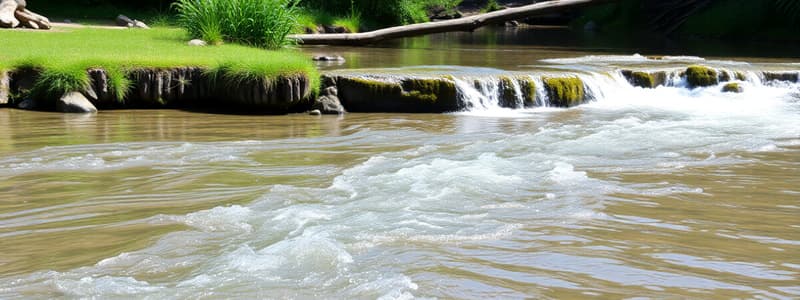Podcast
Questions and Answers
What is a significant consequence of water scarcity?
What is a significant consequence of water scarcity?
- Greater availability of biodiversity
- Reduced competition for resources
- Increased conflict over water resources (correct)
- Improved agricultural productivity
Which strategy is essential for effective water management?
Which strategy is essential for effective water management?
- Focusing solely on domestic water use
- Constructing large dams and water transfer projects (correct)
- Immediate depletion of groundwater
- Ignoring environmental impacts
How does climate change primarily affect water resources?
How does climate change primarily affect water resources?
- By stabilizing water quality across the globe
- By increasing fish populations
- Through altered precipitation patterns and increased evaporation (correct)
- By boosting crop growth rates in all regions
What is vital for achieving long-term water security?
What is vital for achieving long-term water security?
What role do international agreements play in water resource management?
What role do international agreements play in water resource management?
What is a fundamental human right related to water access?
What is a fundamental human right related to water access?
What type of water resource includes rivers and lakes?
What type of water resource includes rivers and lakes?
Which process describes water evaporating from plants into the atmosphere?
Which process describes water evaporating from plants into the atmosphere?
What term describes water that is safe for human consumption?
What term describes water that is safe for human consumption?
What is a major source of water pollution?
What is a major source of water pollution?
What term refers to the movement of water from the ground back to the atmosphere?
What term refers to the movement of water from the ground back to the atmosphere?
Which of the following is considered a significant use of water globally?
Which of the following is considered a significant use of water globally?
Which water resource is stored beneath the Earth's surface?
Which water resource is stored beneath the Earth's surface?
Flashcards
Water Scarcity
Water Scarcity
The lack of enough water resources to satisfy the needs of people and the environment, leading to conflicts, especially in dry areas and during droughts.
Water Management
Water Management
Strategies to efficiently distribute and manage our water resources involving projects like dams, storage facilities, and transferring water from one place to another.
Water Conflict
Water Conflict
Competition for limited water resources amongst different sectors (farming, industry, households) and neighboring countries.
Water Stress and Climate Change
Water Stress and Climate Change
Signup and view all the flashcards
Water Conservation
Water Conservation
Signup and view all the flashcards
Surface water
Surface water
Signup and view all the flashcards
Groundwater
Groundwater
Signup and view all the flashcards
Glacial ice
Glacial ice
Signup and view all the flashcards
Water cycle
Water cycle
Signup and view all the flashcards
Potable water
Potable water
Signup and view all the flashcards
Contaminated water
Contaminated water
Signup and view all the flashcards
Water use
Water use
Signup and view all the flashcards
Study Notes
Introduction to Water Resources
- Water is essential for all life on Earth, crucial for ecosystems, agriculture, and human activities.
- Access to clean, safe water is a fundamental human right and a global priority.
- Water resources are unevenly distributed, creating challenges for availability and management.
- Water scarcity impacts billions globally, causing significant social and economic consequences.
Types of Water Resources
- Surface water: Rivers, lakes, reservoirs, and wetlands, often used for drinking water, irrigation, and industry.
- Groundwater: Water stored in aquifers beneath the Earth's surface, vital for drinking water and agriculture.
- Glacial ice: Frozen water in glaciers and ice caps, a substantial source of freshwater, but vulnerable to climate change-induced melting.
- Atmospheric water: Water vapor in the air, crucial for the water cycle, and collected through condensation for human use.
Water Cycle
- The continuous movement of water between the Earth's surface and atmosphere includes:
- Evaporation: Liquid water turning into water vapor.
- Transpiration: Water released from plants into the atmosphere.
- Condensation: Water vapor cooling and becoming liquid water.
- Precipitation: Water falling to Earth as rain, snow, sleet, or hail.
- Runoff: Water flowing over land into rivers and streams.
- Infiltration: Water soaking into the ground, replenishing aquifers.
Water Quality
- Potable water: Safe for human consumption, meeting specific purity and safety standards.
- Contaminated water: Contains harmful substances (bacteria, viruses, heavy metals), posing health risks.
- Water pollution: Contamination of water bodies (rivers, lakes, oceans) by pollutants, affecting ecosystems and human health.
- Pollution sources: Industrial discharge, agricultural runoff, sewage, and plastic waste.
- Monitoring pollutants crucial for maintaining water quality.
Water Use and Management
- Agriculture: Irrigation is the dominant global water use, demanding significant amounts for crop production.
- Industry: Manufacturing and industrial processes require substantial water for cooling, processing, and cleaning.
- Domestic use: Essential for hygiene, sanitation, and household needs.
- Water conservation: Techniques to reduce water use, using efficient irrigation, water-saving appliances, and public awareness.
- Water management: Strategies for efficient water resource allocation, including dams, storage, and transfers.
- Water scarcity: Insufficient water to meet human and environmental needs, causing conflict (especially in arid regions and droughts).
Water Conflict
- Competition for water resources arises between different sectors (agriculture, industry, domestic) and countries sharing water sources.
- Transboundary water sources necessitate agreements and collaboration for equitable management.
- Water projects can create significant social and environmental impacts, requiring thorough planning and assessment.
Water Stress and Climate Change
- Climate change affects water resources through altered precipitation, increased evaporation, and glacial melt.
- Extreme weather events (floods, droughts) impact water availability and quality.
- Water stress and scarcity are expected to worsen in many regions, increasing existing tensions.
Future of Water Resources
- Investing in water infrastructure remains essential to meet growing demands (dams, pipes, treatment plants).
- Developing water-efficient technologies for agriculture, industry, and households is crucial.
- International cooperation and water-sharing agreements are vital for sustainable water management.
- Conservation measures, including water-efficient practices, are essential for long-term water security.
- Sustainably managing water necessitates innovative solutions, considering the complex interplay of ecological factors and human needs.
Studying That Suits You
Use AI to generate personalized quizzes and flashcards to suit your learning preferences.
Description
Explore the critical role of water resources in ecosystems, agriculture, and human activities. Understand the different types of water resources, such as surface water, groundwater, and glacial ice, and the global challenges related to water scarcity. This quiz will enhance your knowledge of water management and its importance to life on Earth.




